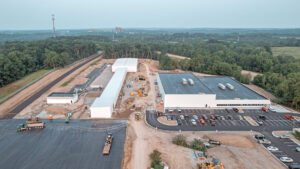“It’s a facility that’s dedicated 100 percent to processing safety defects,” says Benjamin Michajlyszyn, director of the Hyundai Safety Test and Investigations Laboratory that opened in October on Geddes Rd. in Superior Twp. With ten labs looking into everything from materials and forensics to high-voltage batteries, plus crash testing facilities and a 400-meter test track, it’s “the first of its kind with any automotive OEM [original equipment manufacturer],” says Michajlyszyn (pronounced “me a lish en”). The goal, he says, is to find the root cause of safety problems and develop solutions to make both current and future vehicles safer.

Hyundai’s new auto safety lab off Geddes Rd. cost $51.4 million, and the company is donating another $50 million through EMU for STEM education. Off US-23 in York Township, Toyota just broke ground on a $48 million EV battery lab. | Photo: Courtesy of Car Labs
Founded in California in 1986, the technical center moved to Michigan in 2005. Its latest expansion grew out of a 2020 consent order between Hyundai, sister company Kia, and the National Highway Traffic Safety Administration to resolve an investigation into engines seizing in 2011–2019 vehicles equipped with “Theta II” engines.
After determining that the companies had moved too slowly in recalling more than 1.6 million potentially affected vehicles, NHTSA assessed up to $210 million in penalties. It also required Kia to establish a new safety office and Hyundai to spend at least $25 million on a U.S.-based test laboratory. The new lab ended up costing twice that—Michajlyszyn says the tab came in at $51.4 million—and the company is donating another $50 million to EMU to develop STEM programs at area schools.
“The company decided to focus on safety for our customers and others who interact with our products,” Michajlyszyn says, “The intent is to be the leader in automotive safety. We want to protect our customers and who they interact with when using the roadways or interfacing with our vehicles.”
At a September ribbon-cutting, state rep Jason Morgan said he hopes the new center will help “Ann Arbor’s very strong commitment to Vision Zero and ensuring that we have no pedestrian deaths in our community” by 2025. The best way to do that, he says, “is to make sure that our cars have the safety equipment that prevents them from hitting a pedestrian.
“We could do all the other infrastructure to protect people. But at the end of the day, if the car can be smarter than a person and brake itself, that seems like a winning solution for everyone.”
Toyota has been in Ann Arbor since 1972, when it bought a former garage on Pontiac Tr. just down the road from the EPA national vehicle emissions lab on Plymouth Rd. It grew from an emissions lab into a full technical center that moved to the Ann Arbor Technology Park off Dixboro Rd. in 1991 and expanded to the former site of Ypsilanti State Hospital in 2006. Toyota broke ground there this fall on a new, $48 million lab focused exclusively on batteries for electric vehicles.
“We are constructing a battery lab to conduct domestic tests of battery cells, modules, and packs to ensure performance quality, durability, and reliability of production at Toyota’s North Carolina [battery] plant,” a spokesperson emails. The company “chose Michigan because it is the home of Toyota’s North American R&D headquarters with existing expertise and supporting infrastructure to conduct this activity.”
Beyond that, details are scarce. But earlier this year Toyota confirmed an overhaul of its electric vehicle production and parts processes. Long castigated for its relatively slow EV adaptation, it’s lately been vindicated as companies that promised to move faster had to pull back due to lagging demand.
Meanwhile, it released a road map this year for launching more durable, energy-dense EV batteries—including the long-elusive goal of solid-state batteries that won’t need liquid electrolytes. The spokesperson emails that solid-state batteries “offer the potential for improvement across some key areas: quicker recharge times, greater energy density, lighter weight and smaller volume.”
Since the technology “is still in the development stage, there’s nothing to detail at this time,” the Toyota spokesperson writes. Hyundai, whose project is further along, is more forthcoming: Michajlyszyn says the safety lab “is expected to bring in 160 employees. We will be hiring quite a few folks from the local area to fill the roles that will be opening.”